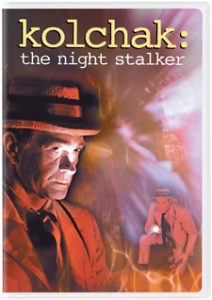I’ve tried to keep this blog positive over the last couple years, and although the title of my 300th post sounds like a mean jab at a failed TV show, I’m actually going to celebrate this milestone blog entry by saying something that never gets said by TV-geek bloggers when talking about a network: “The Cape’s” short run was handled with perfect fairness by NBC.
Tripping over ‘The Cape’
“The Cape” was given substantial hype by NBC, it was given a fair run (nine episodes on air plus one online), and it wasn’t a success creatively or ratings-wise, so therefore it was canceled. Sci-fi fans have no business crying foul about this one. “The Cape” wasn’t a good show, and if a show isn’t good through 10 episodes, it’s not going to get good.
The elephant in “The Cape’s” room — the fact that The Cape is clearly Vince Faraday, and therefore everyone should recognize this when they meet him — only became more distracting as the series wore on, and it seemed like the writers had no intention of doing anything about the problem.

“The Cape” (2011)
NBC, 10 episodes
Showrunner: Tom Wheeler
Stars: David Lyons, Keith David, Summer Glau
In what turned out to be the series finale, Vince, disguised only by a hood and eye-mask, speaks with his best friend face to face, and the friend doesn’t make the connection. Neither does Vince’s wife or son; the son, in fact, had met The Cape — hiding behind a thin veil of smoke — several times before that on his rooftop.
The double-identity thing works for Superman and Batman because they’ve been grandfathered in from the innocent days of four-color comics. Also, you could make a case that Clark Kent is a mild-mannered reporter and Bruce Wayne is a rich playboy, so people’s minds just don’t make the leap.
It’s like when you see someone you know, but they are out of the context where you usually see them. Suddenly you are stumped. It’s a tenuous argument, I know, but it allows for suspension of disbelief if we like the rest of what we see in the “Batman” or “Superman” stories.
Underdeveloped and campy
But Vince is a crime-fighting cop and The Cape is a crime-fighting superhero who does nothing to disguise his voice. Granted, Vince is presumed dead in an explosion, but that’s a thin argument when you see the interactions play out on “The Cape.”
Outtakes must certainly exist where an actor breaks from the script and says, “Wait a minute, I know you …” That should’ve been an actual scene a few episodes into the series.
With “The Cape,” I always wanted to like it, but I never quite did. My favorite episode is “Dice” (most episodes were named after the villain of the week), where Mena Suvari plays the sexy title character who uses her knack for predicting outcomes to nearly snuff supervillain Chess.

But the other villains aren’t as good, the heroes are under-developed, and although the tone is mostly serious, too many uncomfortable moments of camp throw it off the rails.
The Onion AV Club had a blast bashing “The Cape,” and I don’t blame them, but even they had to recognize the bizarre conundrum of this disappointing show: The actors are actually quite good. David Lyons shows leading-man presence, Keith David brings his usual gravitas and James Frain is an excellent villain. Vinnie Jones seems a little off because he plays his villain for camp value when no one else is, but that doesn’t necessary mean he is in the wrong.
Wasted Summer
Summer Glau comes off the blandest of all the actors, which just goes to show that writing is much more important than acting if you want to make a quality TV show, because we know Glau can knock it out of the park.
Previously, though, she had gotten fastballs from the writers — “Firefly,” “Sarah Connor,” her guest stint on “Dollhouse.” Here, she takes a pitch outside and in the dirt (especially in that episode where she sits paralyzed in a chair while The Lich fawns over her). The “Cape” writers just hadn’t gotten around to developing super-blogging orphan Orwell, and frankly, I doubt they had any great tricks up their sleeves.
Despite its flaws, I consider “The Cape” a noble failure. I was looking forward to two shows this midseason, and “Mr. Sunshine,” although obviously a better show than “The Cape,” is the more disappointing entry to me, and that’s why I dumped it after three episodes.
“The Cape” isn’t an imitation of current shows; its biggest influence is “Batman,” but three years removed from “The Dark Knight,” it never feels like it is trying to cash in on a trend. On the other hand, “Mr. Sunshine” is interchangeable with about 10 other sitcoms on the air right now.
So yeah, NBC got it right. They took a chance on an ambitious show, they gave it a fair shot, it was bad, and they canceled it. It’s so often done the other way (good shows mistreated and eventually canceled, bad shows hyped up and kept around) that it’s refreshing to point out that this project was handled with fairness and dignity.

